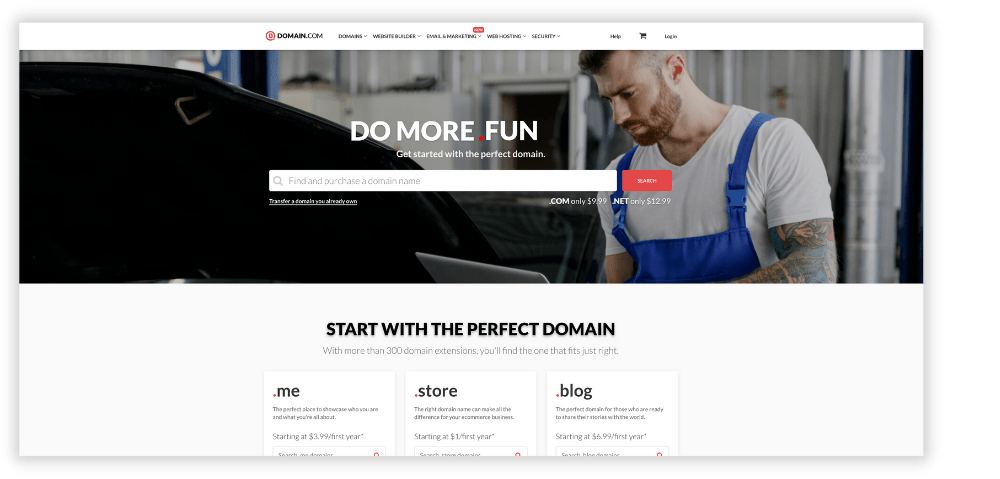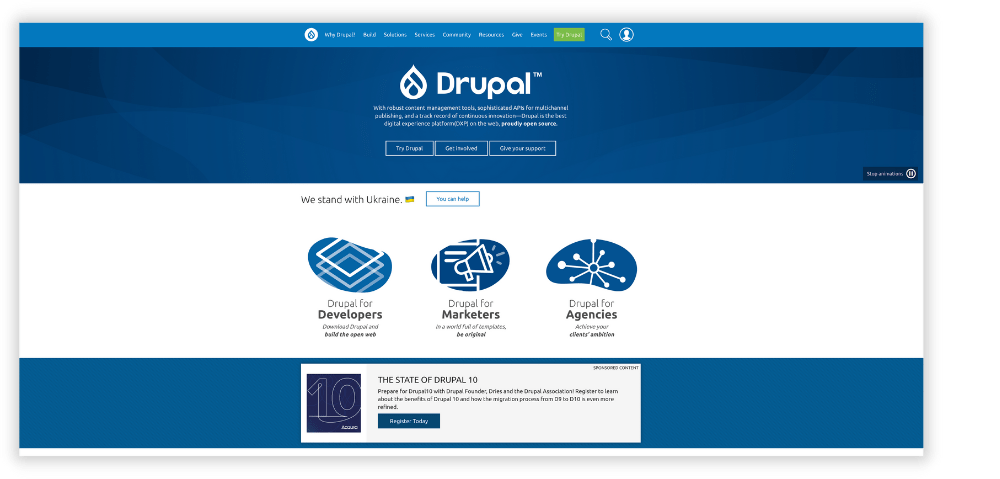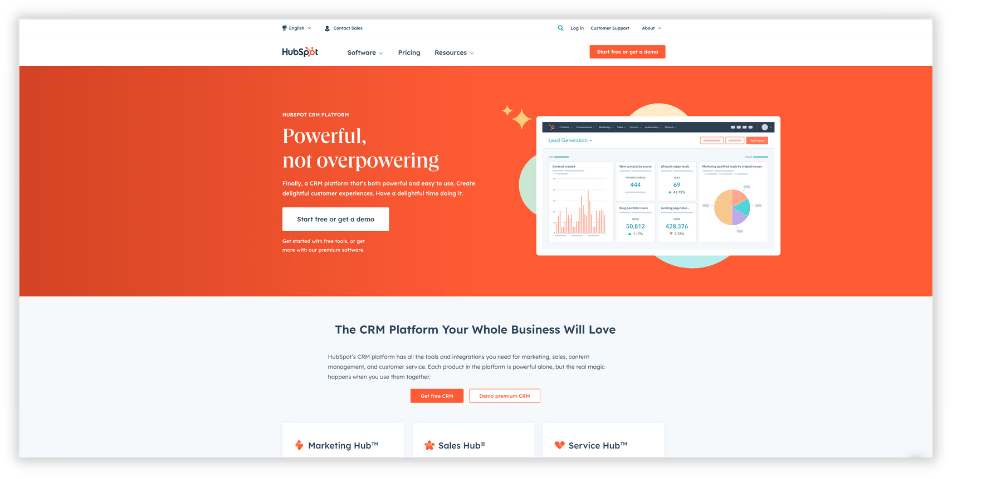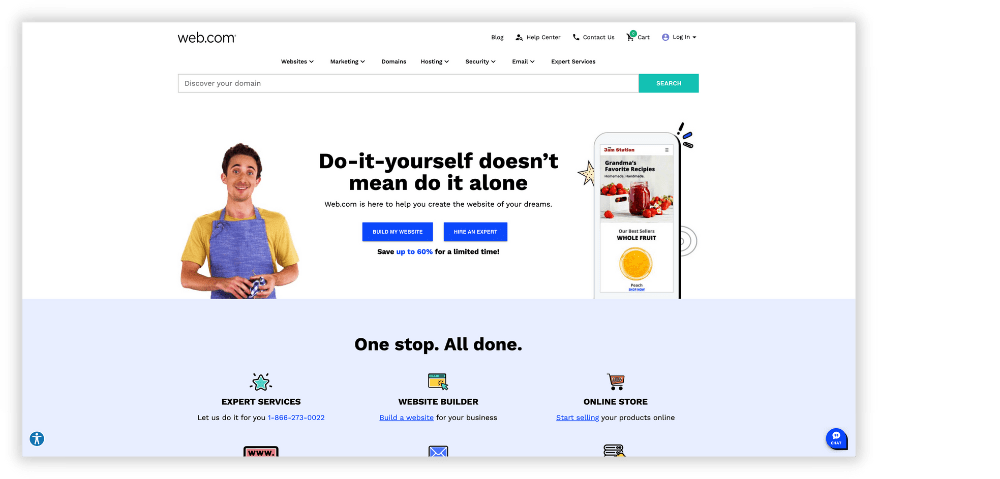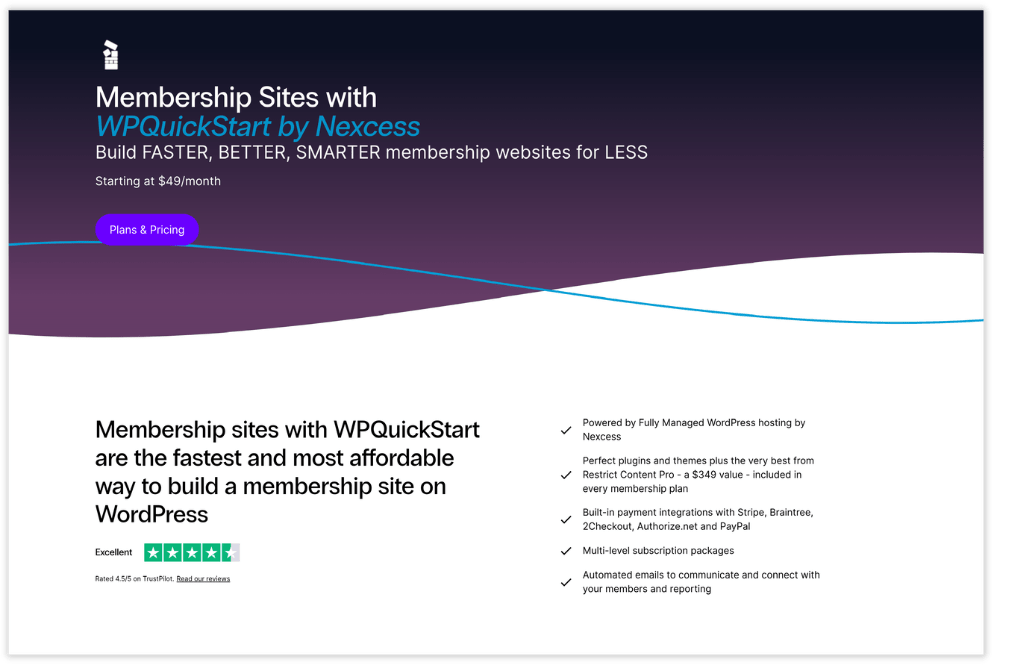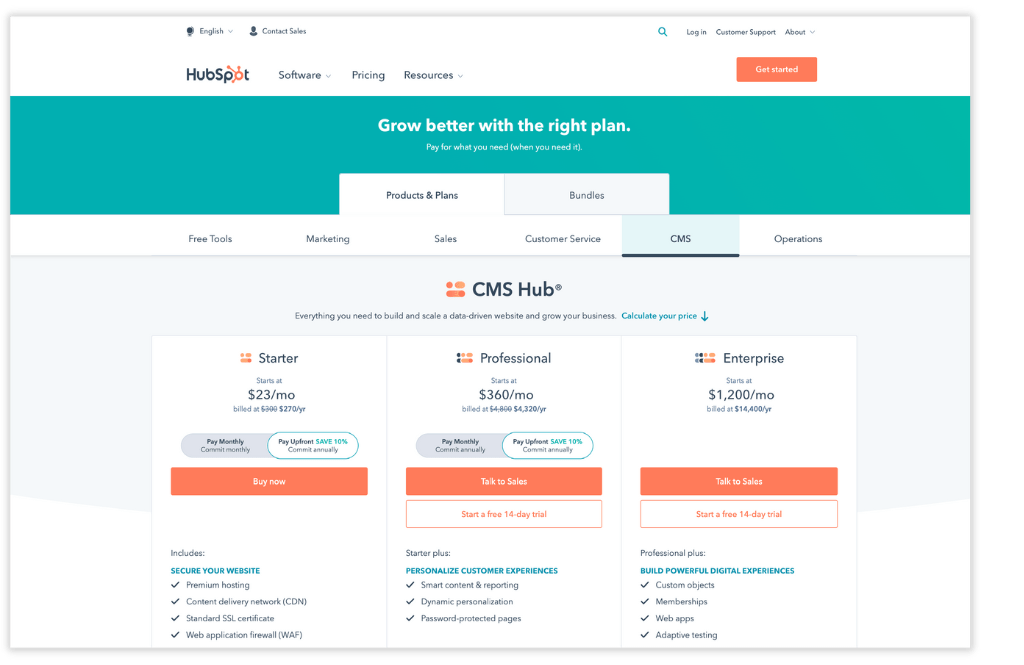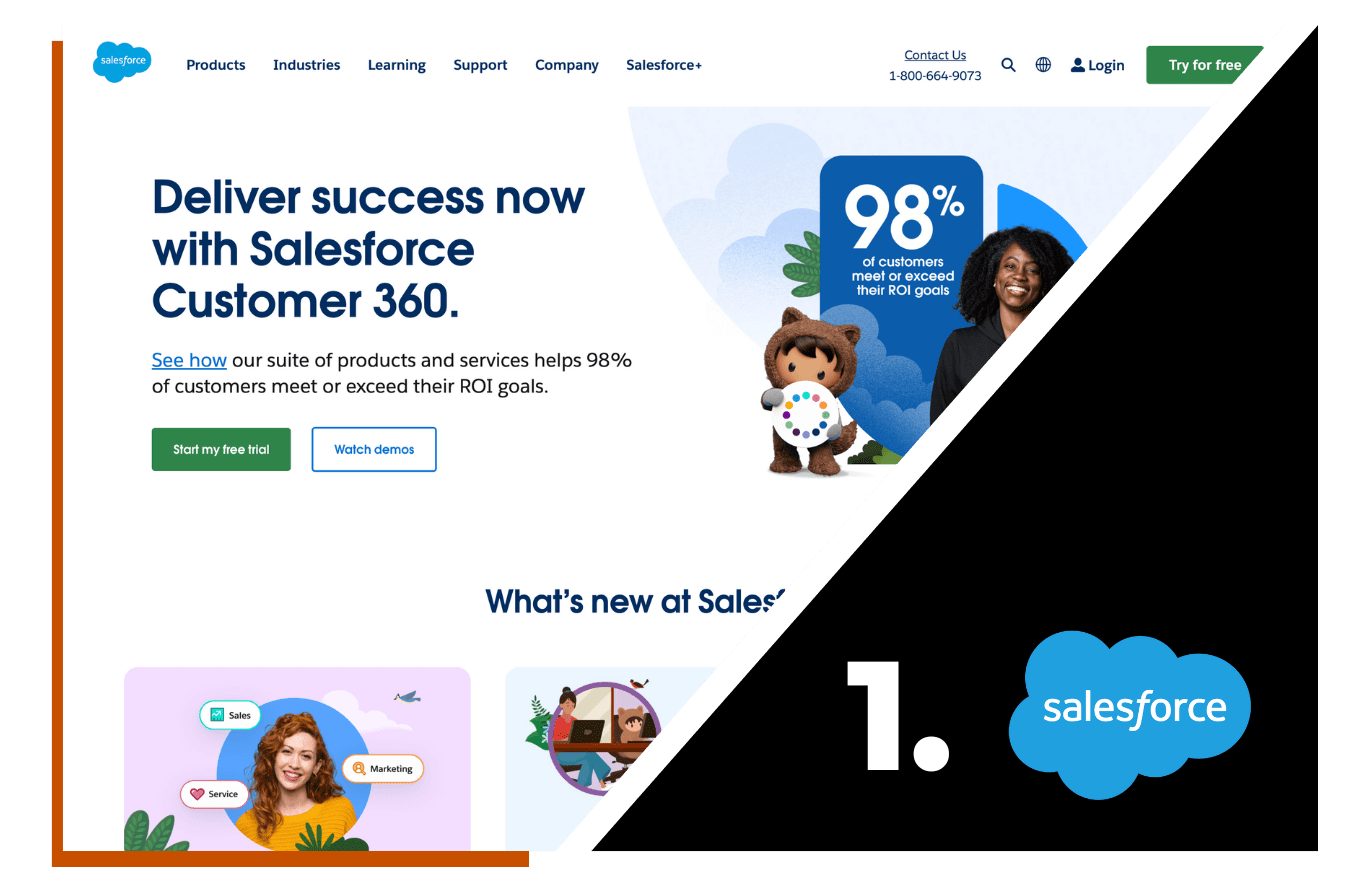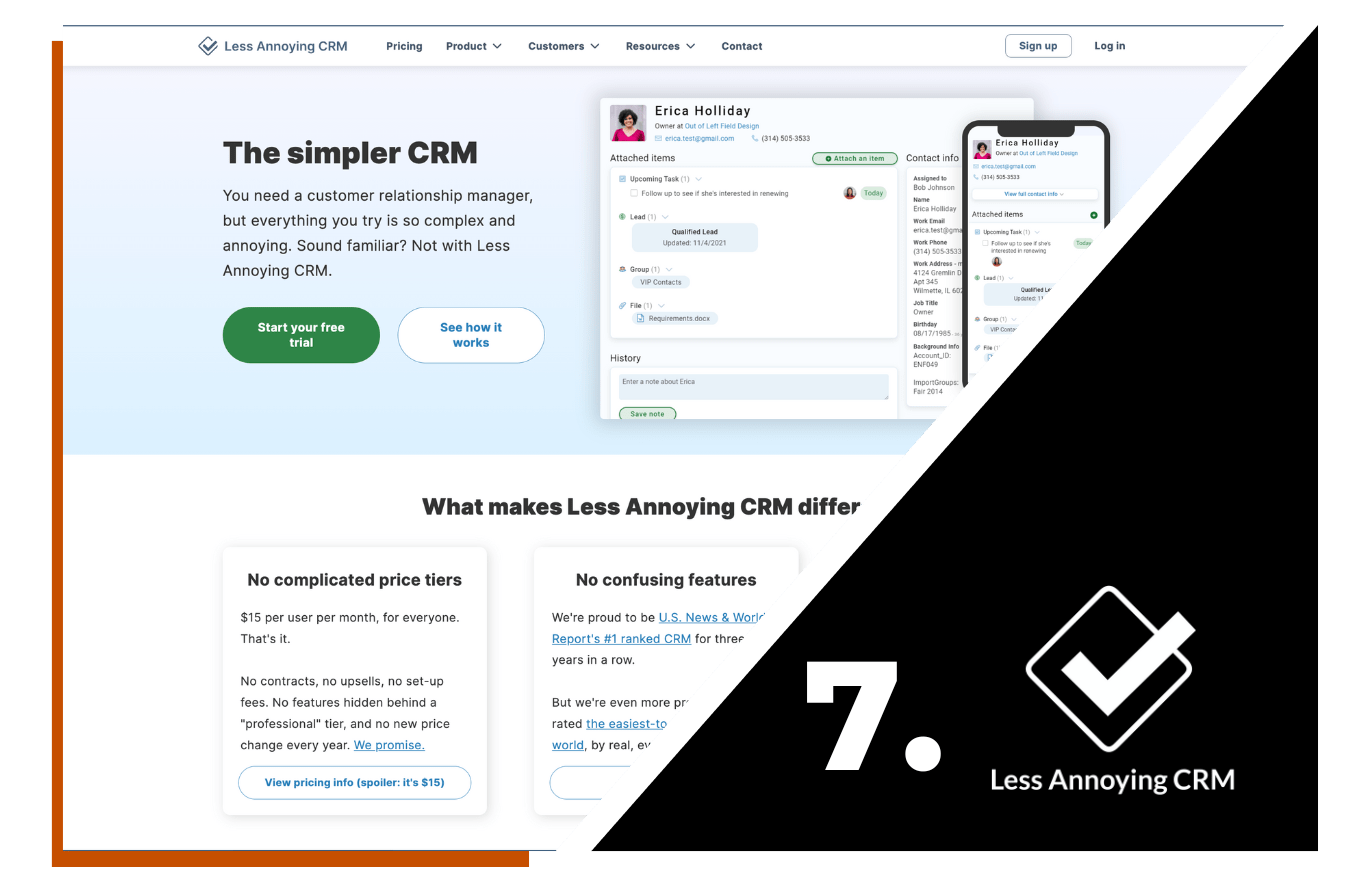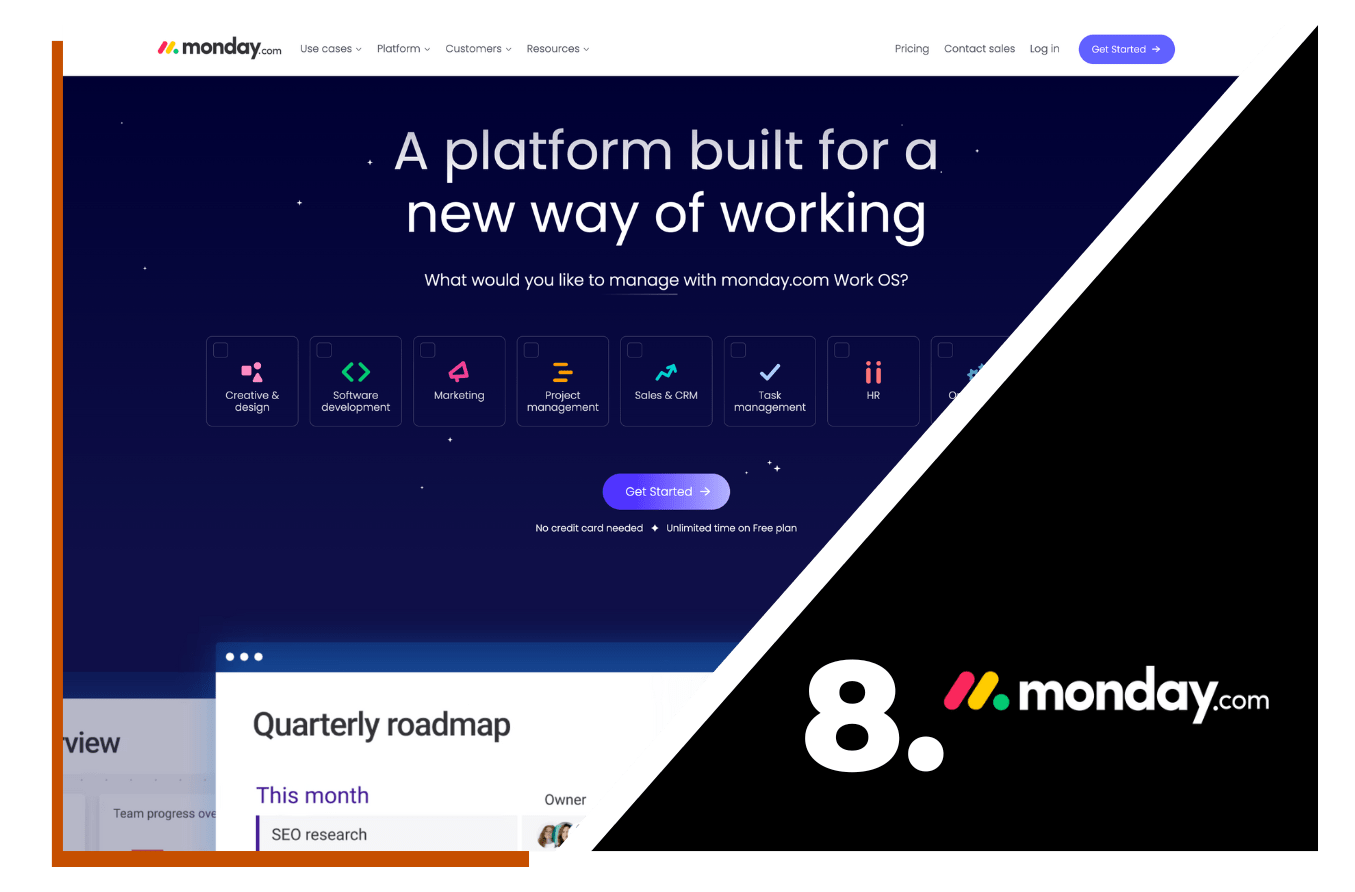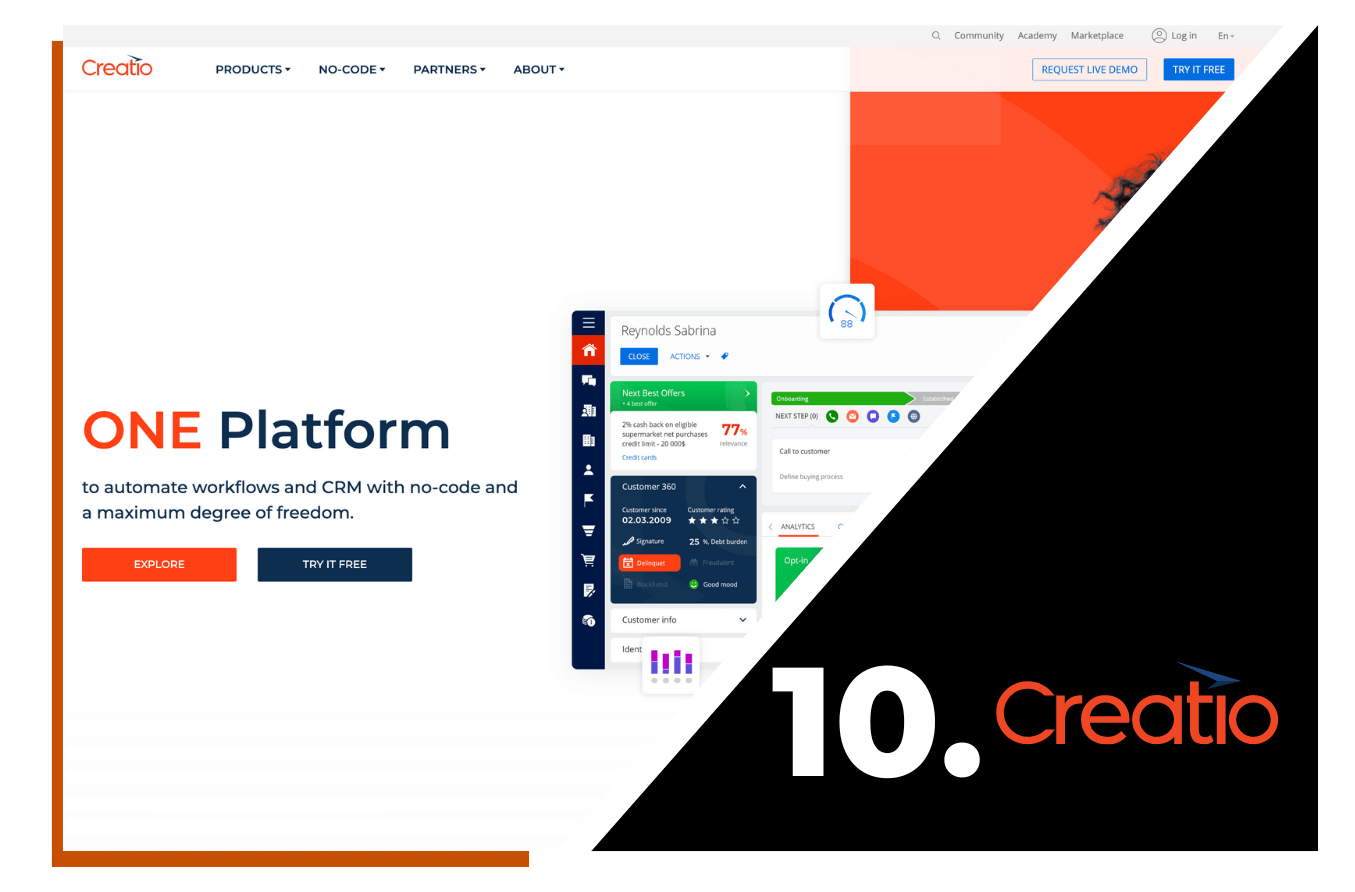What is Digital Engagement?
9 Best WordPress Alternatives for Building a Website
- Community
- Content Strategy
- Innovation
- and 4 more...

When it launched in 2003, Wordpress sparked something close to a digital revolution. Suddenly, almost anyone could make a professional-grade website packed full of high-quality content, and it now dominates the market.
Believe it or not, about 43 percent of all websites currently run on Wordpress1, making it the most popular website builder in the world. But it’s not the only option. And if you’re about to take the plunge, you should ask yourself:
What kind of WordPress alternatives are out there?
It’s true that Wordpress is a powerful tool, with things like drag-and-drop block editing, thousands of themes and countless plug-ins to choose from, but it can also get complex pretty quickly. Perhaps the plug-ins you’ve chosen are not compatible with each other… that happens. Or maybe you’re not up for the hassle of managing your own web hosting, with security and updates and all the rest.
Luckily, many WordPress alternatives exist. Some offer a simple approach, while others are extra flexible. Some emphasis e-commerce, while others are great for blogging. You just need to know what's right for you.
We’ve scoured the internet to compile a list of the 9 best WordPress alternatives for building a website, with hopes of giving you a fuller picture of the options.
1. Wix
Wix is probably the best-known Wordpress alternative, and there’s good reason for that. If you’re looking to keep things simple, Wix is great for building basic websites with a similar drag-and-drop model to Wordpress, but a more streamlined list of plug-in options to choose from.
2. Domain.com
Next up we have Domain.com, which excels in a few areas where Wordpress does not – right out of the box. While WordPress needs some customization before you can start selling goods and services, Domain.com comes ready-to-go with e-commerce capability. Good news if you need to set up shop.
3. Shopify
Then we have Shopify, and just by the name you can tell – it’s built for e-commerce. Shopify is one of the best Wordpress alternatives if you need a digital storefront, and with great-looking templates, payment option tools and 24/7 tech support, you get a professional feel without much heavy lifting.
4. Drupal
As far as rivals to Wordpress, Drupal is most popular with bigger organizations. If you’re looking to create a website with complex, one of a kind content at enterprise scale, Drupal is almost endlessly customizable, and highly adaptive. The drawback is you’ll need some technical know-how to set it up.
5. Squarespace
Squarespace is a great Wordpress alternative with a little something for everyone. Whether you’re building your first site for a new small business, or you’re a creative looking to showcase your work, it has a familiar drag-and-drop feel, and templates that often look better than the competition.
6. Hubspot
Searching for a high-tech solution? Hubspot’s CMS Hub is a powerful content management system – and its main draw is a fully-hosted platform, meaning it can handle all that pesky back-end maintenance on its own. Plus, with automated marketing tools and killer analytics, you get a lot of bang for your buck.
7. Ghost
Not all websites are intended to sell stuff – some are just there to deliver fantastic content – and if you are a writer of any kind, Ghost might be the way to go. With powerful SEO and publishing tools built right in, plus things like an RSS feed builder and full-picture editor, this is a great choice for creatives.
8. Web.com
Web.com is a good choice for Wordpress alternatives that don’t break the bank – or take over your life. Relatively inexpensive and easy, users can start by choosing from a list of templates. Or, with the added ability to make your own design, this option can also help you create a truly unique brand experience.
9. Medium
Another example in the world of Wordpress alternatives is Medium. Perfect for publishing text, you’ve probably read a column written by a celebrity on Medium in the past – even if you didn’t know it. It’s not as endlessly customizable as some of the others. But it’s clean looking if the written word is your thing.
In the end, this is still just a fraction of the website-building options out there, and it might sound like a lot to think about. Whether you just need a website or if you're looking to give your community a home, it’s a decision you can’t afford to sleepwalk into. Take the time to decide what works for you.
Get Started With Cause Machine
Starting with a community engagement strategy is the secret to building a successful platform in the long term. Cause Machine helps customers build the plan of engaging a community well and then begin mapping out the technology to help support that strategy. We’re certain that you’ll find some great resources and powerful tools in Cause Machine to better engage your community. Learn how it can work for you here.
3 Membership Site Tools to Inspire Your Approach
- Community
- Content Strategy
- Innovation
- and 3 more...

So you’ve built a thriving community around a bold cause or brilliant product. Great work! But you’re not done yet.
As your project scales up, one of the most powerful tools you can implement is a membership site, turning “users” into members, driving engagement to your cause… and even monetizing your work.
With the creator economy growing, all sorts of businesses use membership sites – which is really just website that features some sort of “gate,” beyond which only members can pass.
Artists and influencers, nonprofit organizations, social clubs, associations, even retail businesses use these since they all need to present content that only members have access to. That could be special sales and exclusive products, digital classes, or even just a newsletter, and these memberships don’t even have to be paid – they could just involve opting in. But the point is this: Being a member comes with special privileges… and added consumer value.
From your perspective, this added value is the key. It can lead to more revenue for your business, repeat visitors to your site, longer session times, and greater sales numbers – and plus, you could even add a revenue stream if the memberships are paid. But like anything, there are different methods to building a great membership site for your community, and different strengths to each approach.
3 popular membership site approaches:
1. WPQuickStart
WPQuickStart for Membership Sites is a plug-in service designed especially for WordPress – the website builder used by almost half of all websites worldwide. If you already have a website, and it’s running on WordPress, this offers a way to add membership functionality.
Key Features
- Fast and easy set-up
- Multi-level subscription packages
- Built-in tools for payment, marketing, and analytics
- WordPress Security
2. CMS Hub from Hubspot
On the other hand, creating a membership site using CMS Hub from Hubspot can help you create a customized experience. More than a plug-in that works with your WordPress website, this standalone content management system is fully hosted by Hubspot (and fully integrated with its marketing, sales, and service tools). The possibilities are endless. You can create multiple membership tiers, with unique perks included in each. But the downside is higher cost – and the fact that one-of-a-kind creations take time and expertise.
Key Features
- Hubspot hosting and systems integration
- Full design flexibility
- No plug-ins necessary
- Personalize membership experience
3. WildApricot
Creating a connected membership site usually comes down to whether or not the platform can truly meet your needs. Another solution that has membership capability is WildApricot. WildApricot has a variety of ways to build and run your community. One is a built-in member database that allows you to manage how members interact with one another, share exclusive member-only content and more. You can create multiple tiers of membership and encourage users to join up with membership applications. WildApricot is a solid option for launching a membership site.
Key Features
- Member database
- Event management
- Mobile app
- Online store
Transitioning from casual users into highly-engaged members is crucial to growth and monetization, and so is using the right platform to do it. Ideally, you’d keep everything from website building to e-learning and membership controls in one place (with a little marketing prowess and analytics thrown in), so you don’t have to piece your digital footprint together.
Get Started With Cause Machine
Starting with a community engagement strategy is the secret to building a successful platform in the long term. Cause Machine helps customers build the plan of engaging a community well and then begin mapping out the technology to help support that strategy. We’re certain that you’ll find some great resources and powerful tools in Cause Machine to better engage your community. Learn how it can work for you here.
CRM Software for Small Business - Top 10 Solutions (2023)
- Framework
- Marketing
- Measures + Reporting
- and 2 more...

Whether you’re just starting out or already a crafty veteran, the proper CRM software for small business is essential. CRM stands for Customer Relationship Management, and when implemented correctly, it can supercharge sales, drive exponential growth and let you provide incredible customer experiences.
Sounds too good to be true, right? Well, not necessarily.
With the right CRM software for small business, you can create a central hub of customer information that allows your team’s different departments to optimize their effort. CRMs can track sales, quickly organize analysis and encourage collaboration, getting everyone on the same page and putting all the elements of a successful business in one place.
In an increasingly data-driven world, this is a critical piece of the small-business puzzle, with the best options aiming for clarity – letting you spend less time cobbling insights together and more time engaging your community. But, the CRM landscape is large, and with so many options, getting started can feel daunting. Even deciding which type of CRM software is right for you may not be easy.
There are 3 types of CRM software for small business:
Collaborative – To help teams within your company work together more seamlessly.
Operational – Automated, tactical solutions that make your customer experience better.
Analytical – Providing insight into customer behavior, helping you steer toward greater results.
With those in mind, we’ve broken down the top 10 CRM software solutions for small businesses.
1. Salesforce
Salesforce is an all-in-one CRM with a sales focus, helping manage contacts, leads and more into an interactive dashboard. The result is a big-picture view of your business, and you can add features as you grow.
Key Features:
- Cloud-based platform with mobile app
- Scales with your business
- Lead management
2. Zoho CRM
Zoho CRM is a popular choice for small startups looking to keep expenses down, because its free plan allows up to three users. You can create sales workflows and keep track of customers, and switch to a paid version for more features.
Key Features:
- Free option for three users (Good for those just starting out)
- Add-on apps to integrate marketing, inventory and accounting (paid version only)
- Workflow automation
3. Zendesk Sell
For small businesses relying heavily on customer support, Zendesk Sell funnels all customer interactions into a single interface, tracking leads and keeping your team informed. It even allows calls to be recorded, helping your help desk be its best.
Key Features:
- High performance help desk features
- Call recording
- Sales triggers
4. Insightly
Insightly works best for small businesses with project-management needs. If you need to track a project from inception through implementation, delivery and review, this CRM can help keep things running efficiently.
Key Features:
- Chart-view tracking of project workflow
- Easily import date from other apps
- Mass Email Contacts with MailChimp Integration
5. Agile CRM
Like its name suggests, Agile is a CRM for small business which excels at being versatile – namely by adding top-notch marketing features. It’s ideal for shops where sales and marketing team members work closely together.
Key Features:
- Streamlined sales and contact tools
- Drag and drop marketing campaign builder
- Project management tools
6. Keap
Keap is another CRM which combines sales and marketing prowess, where leads can be organized, tracked and turned into sales. Plus, it offers expert instruction to get the most of the platform.
Key Features:
- Automated lead capture and organization
- Expert coaching and support
- Great email marketing features
7. Less Annoying CRM
Knowing that complexity is a small-business turn off, Less Annoying CRM is exactly what it claims to be. It lets you manage your contacts, calendar, and more without getting lost in the tech-feature weeds.
Key Features:
- Built for ease of use, less complexity.
- Straight forward, to-the-point feature set.
- Relationship management
8. monday.com
If you’ve got a fast-moving team who need to be in lockstep, monday.com could be your ideal CRM for small business. Those familiar with Kanban will find its visual organizer especially easy to use.
Key Features:
- Kanban-style organizer boards
- Free option with robust features
- Dynamic sales pipelines
9. Freshsales
For many small businesses, finding and developing leads is a key concern, and Freshsales is built to make that easier. Automatically capturing and tracking potential customers is the beginning of rising revenues.
Key Features:
- Built-in lead generation
- Advanced analytics
- Make calls & send emails
10. Creatio
Creatio can take a complicated, multi-step process and make it (relatively) simple, by automating the sales cycle, marketing approvals and more. And best of all, you don’t need to be a code wizard.
Key Features:
- “Process library” of pre-built workflows
- Intuitive customer record keeping
- Automated marketing campaigns
Remember, with the right CRM software for small business; you can take your customer experience to the next level – along with your sales, revenue, and more. As long as you're in a system that WORKS for your business!
So, which CRM solution is best for you?
Ask these 3 questions about your business needs:
1. What are we trying to achieve? (Manage Customer Relationships, Leads, Audience Segmentation)
2. What features are needed to achieve our goals? (Email sender, automation capabilities, etc.)
3. What is our budget?
When comparing platforms, look for those with numerous positive reviews and a good track record. If you're on a budget, shoot for the middle of the market. You'll find a reliable platform that may have some feature limitations. But, if you need a CRM as dynamic as a fighter jet, then there's a solution for your organization out there!
Cause Machine Solutions
One of the most significant pieces of what sets Cause Machine apart from other technology platforms is where we start… with a community engagement strategy. We begin all of our work on the foundation of engaging a community well and then begin mapping out the technology to help support that strategy. We’re certain that you’ll find some great resources and powerful tools in Cause Machine to better engage your community as well. Learn how it can work for you here.
Seven Types of Innovation

There are countless types of innovations you could facilitate - each with their own strategy, design, timeframe, and more. The important thing to know is that each type of problem you’re working to solve has a unique run of play for how that innovation should be facilitated. My goal here is to unpack seven core types of innovations to consider. It’s important that you help your client understand which innovation they are desiring before launching the event.
#1 Concept Sketch
Overview: A Concept Sketch Innovation is when there is a felt need and/or a basic idea with a very open minded or open-handed approach to how that might come to life.
Goal: The outcome from this innovation would be a fresh idea, in concept format, for how to approach this problem.
#2 Framework Design
Overview: A Framework Design Innovation is when there is a defined project/goal but there is a needed framework or picture needed to help simply capture the overall complexity.
Goal: The outcome from this innovation would be sketches of this framework (picture, pathway, etc.)
#3 Vetting Concept
Overview: A Vetting Concept Innovation is when there is a plan in motion and a fairly good picture of the desired goal, but a desire to “vet” out the concept more and gain more collaborative buy-in.
Goal: The outcome from this innovation would be more details to the plan, a stronger prototype of the concept, and greater unity around the vision.
#4 Business Plan
Overview: A Business Plan Innovation is when there’s an agreed upon plan already existing, but there is lacking a more comprehensive business plan with specific details for execution
Goal: The outcome from this innovation would be a multi-page business plan outlining specific Go to Market strategies.
#5 Resource Design
Overview: A Resource Design Innovation is when there is a need to design (or potentially redesign) a resource - focusing on the resource design, purpose, and delivery.
Goal: The outcome from this innovation would be the prototyping of fresh resources with some content creation and strategy.
#6 Process Design
Overview: A Process Design Innovation is when there is a new process (or a process to re-vision) and a need to collaboratively streamline and make a process.
Goal: The outcome from this innovation would be a process design map with detailed steps, dependencies, and outcomes.
#7 Rethink
Overview: A Rethink Innovation is when there is a pre-existing program that could use some fresh thought and fresh ideas.
Goal: The outcome from this innovation would be a new concept plan for how to approach this in a more current context.
As you can see, there are many types of innovations you could facilitate. More than likely, just seeing the list sparked a few ideas for innovations you might consider.
Cause Machine Solutions
Here at Cause Machine, we help organizations solve complex community engagement problems/questions. We use these disciplines of innovation ourselves in our own development process and have helped lead many organizations through their own process of innovation discovery. Leveraging the Cause Machine platform for engaging your community helps you be confident that the foundations of this platform are built on time-tested best practices of great processes like innovation and design thinking. Schedule a demo today!
8 Best Website Builders for Small Business

Even for the smallest of businesses, a quality website is a non-negotiable, a sort of must-have.
But what's the best website builder for small business?
There’s plenty to consider. But first, you need to identify your “why?”
According to Forbes (and countless other business experts), websites make or break companies every day. A good one will lend you credibility, expand your market and save you time on basic customer service issues.
A bad one will be a waste of money (at best) – or at worst, drive business away.
Ultimately, your website will help build your brand and make you money, and for most small businesses, it’s totally within reason to create one yourself.
We’ve researched the options for the best website builder for small business and narrowed down the results so you don’t have to.
8 Best Website Builders for Small Business.
1. GoDaddy – Best for First Timers
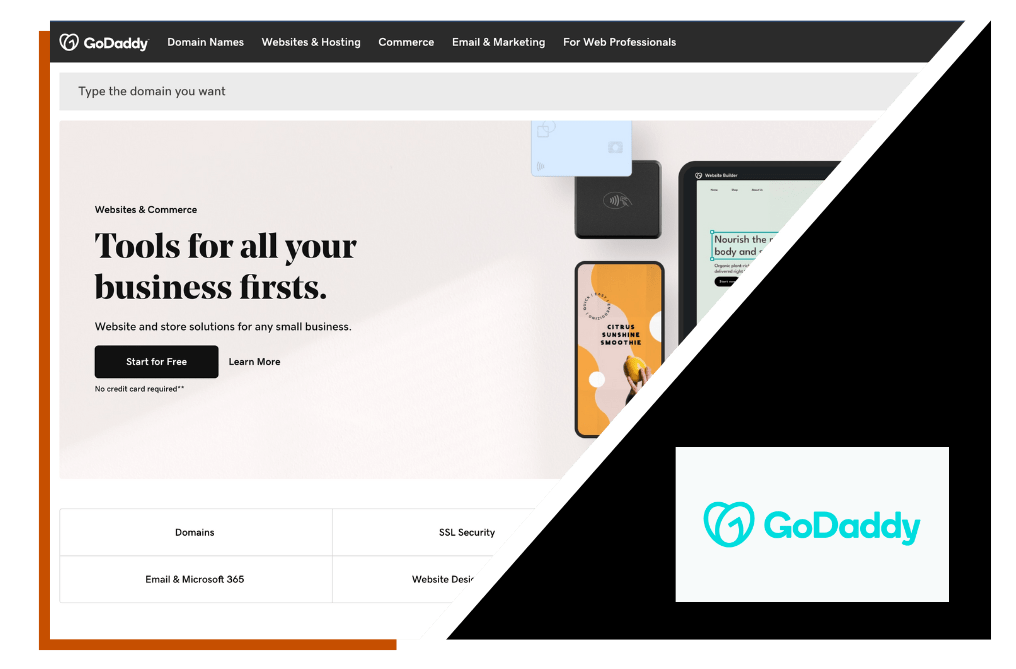
GoDaddy is one of the oldest games in town, and they’ve ironed out most of the kinks for first-time website builders. With a bunch of design tools that don’t require experience to use, you can create a professional-looking website (often for free).
- Free plan suitable for first-time website builders
- Professional looking templates
- Mobile friendly-design space
2. Shopify – Best for E-commerce

Many of today’s small businesses are geared toward e-commerce, and if that’s the case for you, it makes sense to use a website builder like Shopify. Over 1.5 million companies use it to create a top-notch online store, especially small to medium-sized fashion or retail businesses.
- Basic plan for $24/month
- Excellent for online stores and drop shipping
- Internal apps for email marketing and advertising
3. Squarespace – Best-looking designs

If you want your small business to be seen as cutting-edge, this one might be for you. Squarespace pairs excellent brand awareness with all the features of other builders, plus a reputation for sleek design choices. To be your best, you’ve got to look your best!
- Plans for as little as $16/month
- Easy-to-use drag-and-drop design tools and built-in e-commerce capabilities
- Bold, modern templates that are also customizable
4. Cause Machine — Best all-in-one

With so many different tools to make use of, sometimes running a small business can be improved by simply streamlining things. Cause Machine is designed for that, letting you build a website that integrates all aspects of what you do. Blog, membership site, forum or online store, marketing, advertising, social media, Cause Machine puts it all under one digital roof, making it one of – if not the best website builder for small businesses.
Schedule a free demo to amplify your small business mission today.
5. WordPress.com – Best for Control Freaks

But not in a bad way! WordPress already powers almost 40 percent of all websites in the world and for good reason. It’s a content management system (CMS), which gives users total control over the design of their website. Most of the basic stuff is easy for beginners, but you’ll need some skill for advanced ideas.
- If you can dream it, you can build it
- Drag and drop for basic design, great SEO tools, and free to get started
- Need some know-how to create advanced designs
6. Canva – Best for One-Page Website

Of all the best websites for small business options, Canva is great for basic needs. If you just need a one-page website that answers questions like what, where, and why, this one can get you up and running in minutes. It’s got simple templates to ease design decisions, and it’s free to start.
- Very user friendly
- Quickly build a one-page website
- Fewer options mean easier decisions
7. Pixpa - Best for creatives

For visual-based small businesses like photographers, videographers or digital artists, a website builder like Pixpa might be ideal. It puts an emphasis on elements like photo galleries and client testimonials, helping you show off your skills. And you don’t need to know how to code to do it!
- Great design for visual arts professionals
- Motion responsive templates
- But no free version
8. Wix – Best for Design Choices

Wix is one of the well known in the world of best website builders for small businesses, and a big part of the reason for that is its huge menu of design templates. There are over 500 to choose from, and with drag-and-drop editing, you simply plug in your content and go. An ad-supported version is free.
- 500 design templates to choose from
- Streamlined drag-and-drop editing
- Free with ads
Even though websites hold such an important place in the business world, you can still make one yourself. Start with these if you’re looking for the best website builder for small businesses.
Get Started With Cause Machine
Starting with a community engagement strategy is the secret to building a successful platform in the long term. Cause Machine helps customers build the plan of engaging a community well and then begin mapping out the technology to help support that strategy. We’re certain that you’ll find some great resources and powerful tools in Cause Machine to better engage your community. Learn how it can work for you here.


